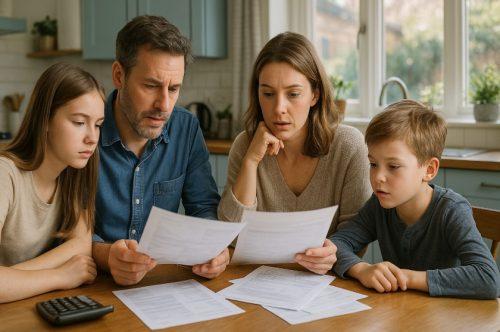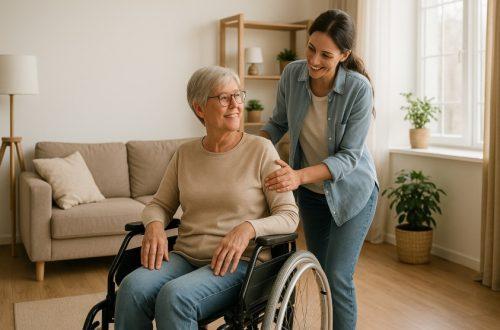Have you heard of the term DWP resident living allowance and wondered if it is an active benefit today? Many people in the UK have searched for this phrase while looking for financial help to manage daily expenses.
The truth is that this term does not refer to a specific benefit in its own right, but it often gets linked with support schemes like Disability Living Allowance, Personal Independence Payment, Attendance Allowance, and Universal Credit.
In recent years, the Department for Work and Pensions also introduced Cost of Living Payments to ease pressure on households during difficult times. Since support systems can change, it is easy to feel unsure about what applies now. This guide explores the background of the term, explains current benefits, and helps you identify whether you qualify for financial help available in 2025.
What is the DWP Resident Living Allowance?

The phrase DWP resident living allowance is not the official name of any UK benefit. However, people often use it when they mean allowances designed to help residents meet living costs. These include long-term disability benefits and income-related support.
In practice, the allowance can be understood as a mix of different financial aids, such as:
- Disability Living Allowance (DLA), which is now being replaced by Personal Independence Payment (PIP)
- Attendance Allowance for those above State Pension age
- Universal Credit for people on a low income
- Past Cost of Living Payments, which were one-off support schemes
This shows that the phrase is more of a general way of referring to benefits managed by the Department for Work and Pensions. The support available depends on your age, health condition, income, and family circumstances. Understanding how these fit together helps you know where to apply and what you may be entitled to.
Are There Any DWP Resident Living Allowance Payments in 2025?
If you are wondering whether Cost of Living Payments will continue in 2025, the answer is no. These payments were designed to provide temporary relief during the years of high inflation between 2022 and 2024. They were automatically given to people already receiving certain benefits and tax credits.
You may have received payments if you qualified for:
- Universal Credit
- Income-based Jobseeker’s Allowance
- Income Support
- Pension Credit
- Child Tax Credit or Working Tax Credit
Although these one-off payments have ended, support is still available through ongoing benefits such as PIP, Attendance Allowance, and Universal Credit. These schemes are designed to help with longer-term needs rather than short-term boosts.
It is important to remember that if you hear about new Cost of Living Payments being offered in 2025, it may be a scam, as no further rounds are planned.
Who Can Claim Disability-related Allowances?

Disability-related allowances form a large part of what many call the DWP resident living allowance. These payments vary by age and location. They are intended to help with additional costs faced by disabled individuals or older residents.
Disability Living Allowance (DLA) for children
DLA is only available for children under 16 in England and Wales. It has two parts, the care component and the mobility component. The amount depends on the level of help needed. In Scotland, children may instead receive Child Disability Payment, which mirrors the same purpose.
Personal Independence Payment (PIP) for adults
For adults aged 16 to State Pension age in England and Wales, DLA has been replaced by PIP. This allowance supports those who face challenges with daily living tasks or mobility. It is assessed through a detailed application and sometimes a face-to-face evaluation.
Attendance Allowance for those over State Pension age
If you are over State Pension age, you cannot apply for PIP, but you may be eligible for Attendance Allowance. This helps with personal care needs like dressing, washing, or supervision for safety. It does not include mobility support, but it can be a vital aid for independence.
Scotland-specific Disability Payments
Scotland runs its own disability benefits. Adults under State Pension age can apply for Adult Disability Payment, while older individuals may qualify for Pension Age Disability Payment. For children under 16, Child Disability Payment applies. This ensures continuity of support across all age groups in Scotland.
These allowances are all tax-free, non-means-tested, and intended to cover the extra costs of disability. Together, they form the backbone of what many think of as a resident living allowance for UK citizens with additional needs.
How Does Universal Credit Help With Living Costs?

Universal Credit is another benefit often included in conversations about the DWP resident living allowance. It is a monthly payment for people with low income or out of work. Unlike disability-related allowances, it is means-tested and takes into account income, savings, and family size.
Universal Credit can cover:
- Daily living costs for individuals and families
- Extra housing support
- Additional payments if you have a health condition or care for a disabled child
Payments are usually made once a month directly to your bank account. For some, this may include additional elements to support disabilities or caring responsibilities. By combining multiple allowances into one payment, Universal Credit simplifies the process but also requires careful budgeting.
What About Support for Carers and Pensioners?
Carers and pensioners also fall under groups that may benefit from what people refer to as the DWP resident living allowance.
For carers, Carer’s Allowance is the main support. You may qualify if you provide care for at least 35 hours a week to someone receiving a disability benefit. It is not based on savings, but your income from work may affect eligibility.
For pensioners, the key benefit is Pension Credit, which tops up your income if it falls below a certain level. It can also open the door to extra help with housing costs and council tax. Additionally, pensioners may receive Winter Fuel Payments, which sometimes include a Pensioner Cost of Living boost.
Together, these supports acknowledge the extra needs of people who either provide unpaid care or live on a fixed pension income.
Do You Need to Apply for These Allowances?
Not all allowances require an application. Cost of Living Payments in previous years were made automatically to people already receiving qualifying benefits. However, most ongoing benefits do need a formal claim.
For example:
- PIP and Attendance Allowance require an application form and sometimes medical evidence
- Universal Credit must be applied for online, with regular updates on your circumstances
- Carer’s Allowance needs proof of the caring relationship and hours provided
Payments are made directly into your account, usually every four weeks or monthly depending on the benefit. If you qualify but do not apply, you risk missing out on essential financial help. Checking your eligibility and following the application process carefully is the best way to ensure you receive the support you are entitled to.
What Happens if You’re Not Eligible?

Sometimes people apply for allowances but find out they do not qualify. This can be due to income levels, savings, age, or the nature of a disability. It may also happen if your benefit is reduced to zero during an assessment period, known as a nil award.
If this happens, other options include:
- Applying for local council support or discretionary housing payments
- Seeking grants from charities and community groups
- Checking eligibility for different allowances, as rules vary between benefits
It is also possible to challenge a decision through mandatory reconsideration if you believe your case has been wrongly assessed. While not everyone will qualify for the DWP resident living allowance or similar schemes, exploring alternative support can still provide financial relief.
How Can You Protect Yourself From Scams?
As benefits and allowances gain publicity, scams often appear. People may receive messages claiming they need to apply for Cost of Living Payments or share bank details to receive them. These are fraudulent and should be ignored.
To protect yourself:
- Remember that genuine payments are automatic if you qualify
- Avoid giving personal details over the phone, text, or email
- Use official government websites to check eligibility and payment dates
Scammers often target those in financial need, so staying cautious is essential. Always verify information from trusted sources before taking any action. Protecting your details ensures you only receive legitimate support without the risk of fraud.
DWP Resident Living Allowance: Is There Extra Support for UK Residents?

While the phrase DWP resident living allowance may not be an official benefit, there are many forms of extra support available for UK residents. Alongside main benefits, you might also access help with council tax, housing costs, or free school meals.
Local councils sometimes offer hardship funds to help with emergency expenses. Charities and community organisations also provide food, clothing, and financial advice. For people struggling with fuel bills, schemes exist to help with energy payments during winter.
Together, these smaller support systems build an important safety net. They work alongside benefits like Universal Credit, PIP, and Attendance Allowance to ensure residents facing difficulties can find some relief. Knowing about these additional options can make a big difference to your financial stability.
Conclusion
The term DWP resident living allowance may not exist officially, but it represents the wide range of benefits and payments that help people manage living costs. From disability allowances such as PIP and Attendance Allowance to income support through Universal Credit, there are systems in place for residents with different needs.
While Cost of Living Payments have ended, ongoing benefits continue to provide long-term assistance. Carers, pensioners, and families also have dedicated support to ease financial pressure.
By understanding what is available and applying for the right allowances, you can access help that makes daily life more manageable. Staying informed and alert to scams ensures you receive genuine support and can take full advantage of the financial assistance designed for UK residents.
FAQs
What replaced Disability Living Allowance in the UK?
Disability Living Allowance was replaced by Personal Independence Payment for adults, while children under 16 may still claim DLA.
Can you still get Cost of Living Payments in 2025?
No, Cost of Living Payments ended in 2024 and there are no new payments planned for 2025.
How do you know if you qualify for Personal Independence Payment?
You qualify if you are aged 16 to State Pension age and have daily living or mobility needs assessed by DWP.
Is Attendance Allowance the same as DLA?
No, Attendance Allowance is only for people over State Pension age and covers personal care but not mobility needs.
Can carers claim more than one benefit?
Carers may claim Carer’s Allowance, but other benefits such as Universal Credit may be affected depending on income.
Do disability-related benefits affect Universal Credit?
Disability-related benefits do not reduce your Universal Credit, and in some cases, they increase your entitlement.
What should you do if you didn’t receive a payment you expected?
You should contact the office that pays your qualifying benefit to check eligibility and resolve missing payments.








